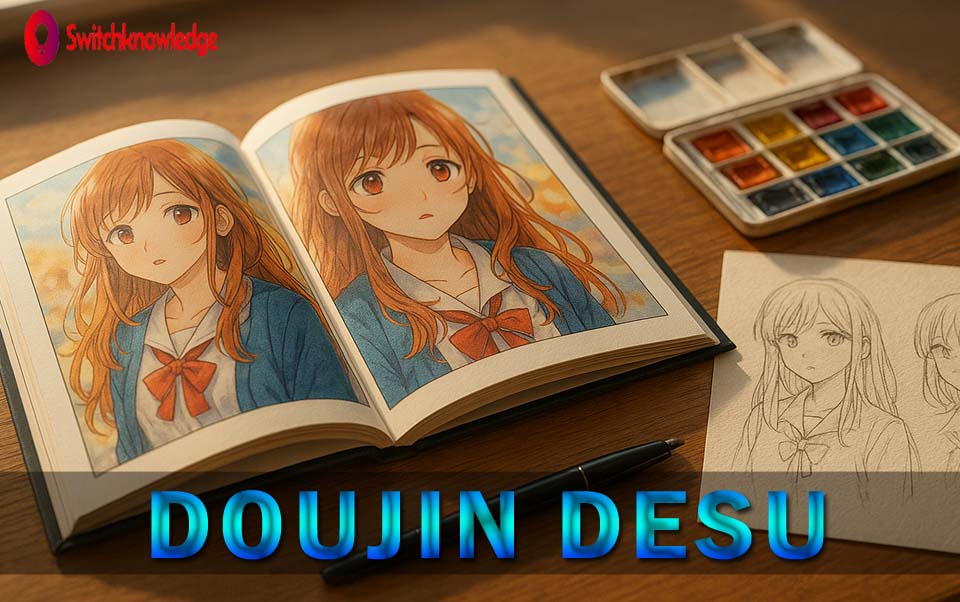Doujindesu: Exploring the World of Fan-Created Manga

In the vast digital universe of anime and manga, one term that has been gaining attention among global fans is doujin desu. For many enthusiasts, it represents much more than just a platform or a website—it’s a gateway into the fascinating world of doujin culture, where creativity, community, and passion converge. Whether you are a long-time anime fan or a newcomer who has just stumbled upon this word, understanding what doujindesu is and why it matters can open new doors to appreciating Japanese pop culture and the communities that surround it.
This article dives deep into the meaning, cultural significance, and future of doujindesu, unpacking everything you need to know in an engaging, beginner-friendly, and SEO-optimized format.
What is doujindesu?
At its core, doujin desu is a term tied to the world of doujinshi—fan-created manga, novels, or art inspired by popular anime, manga, or video game franchises. The word itself combines “doujin,” which refers to self-published works, and the suffix “desu,” a Japanese word often used to make sentences polite or complete. Together, doujin desu has become a recognizable keyword for online communities where fans seek, share, and celebrate doujin culture. Unlike mainstream manga or anime distributed by big publishers, doujinshi is independent, often produced by passionate fans or aspiring artists. Platforms or references under the name doujin desu are usually tied to the accessibility and availability of these works on the internet.The Origins of doujin desu and Doujinshi Culture
To fully understand doujin desu, we must explore the history of doujinshi. Doujinshi originated in Japan as a way for fans and creators to self-publish their works. The earliest examples can be traced back to the early 20th century, but the culture flourished in the 1970s and 1980s, coinciding with the boom of manga and anime. Doujinshi allowed fans to experiment with storytelling, create alternate endings to beloved series, or even parody popular characters. This independent creativity eventually gave rise to massive events like Comiket (Comic Market) in Tokyo, where thousands of artists and fans gather twice a year to buy, sell, and exchange doujinshi. Doujindesu as a modern digital keyword reflects this tradition moving into the online space, making these works more accessible to global audiences.Why doujin desu Matters in Anime and Manga Fandom
A Creative Playground for Fans
Doujindesu represents the limitless creativity of fans. Instead of being passive consumers of anime or manga, fans actively shape and expand universes by writing new stories, experimenting with genres, or merging characters from different series.A Community-Driven Movement
The appeal of doujindesu also lies in its community-driven nature. Doujinshi is not about profit but about connection. Fans who participate in doujin culture often build long-lasting friendships, both online and offline, around shared passions.Expanding Narratives
Mainstream anime or manga may leave storylines unfinished or unexplored. Doujindesu and doujinshi culture allow fans to fill in the gaps, creating alternate endings, crossovers, and explorations of side characters that official creators may not focus on.Features of doujindesu Platforms
While the exact features of platforms associated with doujindesu may vary, several common traits make them appealing to anime and manga enthusiasts worldwide.Wide Range of Genres
From romance and comedy to fantasy and science fiction, doujindesu platforms typically cover an extensive variety of genres. This diversity means that no matter your taste, you’ll likely find stories that resonate with you.User-Friendly Navigation
Ease of access is another hallmark. Doujindesu-related websites or platforms are often designed for simple browsing, making it easy for users to find specific series or explore recommendations.Global Accessibility
One of the reasons doujindesu is so popular internationally is that many platforms offer translations, ensuring non-Japanese speakers can also immerse themselves in doujin works.The Legal and Ethical Side of doujindesu
Doujinshi exists in a unique gray area. While many doujin works borrow characters, settings, or plots from copyrighted material, Japanese publishers often turn a blind eye. In fact, some creators even encourage doujinshi, viewing it as free promotion. However, when doujinshi is distributed outside Japan, especially on platforms associated with doujindesu, copyright concerns become more complex. International copyright laws are stricter, and distributing works without permission can lead to legal consequences. Despite this, doujinshi and platforms like doujindesu continue to thrive because they represent the heart of fan culture. For ethical engagement, fans are encouraged to support original creators by buying official works alongside enjoying doujinshi.Alternatives to doujindesu
Doujindesu may not be the only source for fans seeking doujinshi or manga content. Several other platforms, both official and unofficial, offer similar experiences.- Pixiv: A massive online community for artists, including doujinshi creators.
- Booth: An e-commerce site where many independent creators sell digital and physical copies of doujinshi.
- Official Manga Apps: While not offering doujinshi, apps like Shonen Jump and Manga Plus provide legal access to official works.








